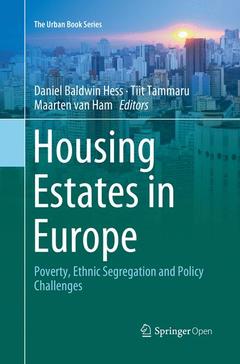Description
Housing Estates in Europe, 1st ed. 2018
Poverty, Ethnic Segregation and Policy Challenges
The Urban Book Series
Language: English
Subjects for Housing Estates in Europe:
Keywords
Geography of Large Housing Estates; Urban Challenges; European Cities; Urban Unrest; Socio-Economic Segregation; Social Problems and housing; Planning Interventions; Urban Population Inequalities; Regional and Cultural Studies; restructuring housing estates; Open Access; urban geography and urbanism
Publication date: 12-2018
Support: Print on demand
Publication date: 08-2018
Support: Print on demand
Description
/li>Contents
/li>Biography
/li>Comment
/li>
Focuses on people-based and placed-based complex challenges of housing estates
Addresses issues from a new perspective previously unexplored in scholarly literature
Thoroughly investigates the role of large housing estates in poverty and ethnic concentrations



